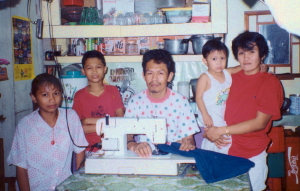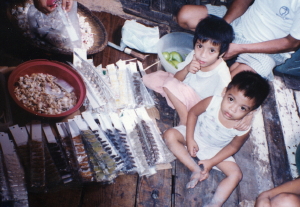|
About Us
Directors & Staff
Projects Current &
Past
Project Summaries
Antique
Batangas
Cotabato
Davao
Iloilo
Metro-Manila
Quezon
Grant Application Form
& Funding Guidelines
Donate Now
How You Can Help
HOME

|
METRO-MANILA
REPACKAGING AND REMANUFACTURING
In the barangay of Tambakan, a sprawling community of flimsy wood
and tin shanties and shelters in the Santa
Ana district of Metro-Manila, the Filipino Children’s Fund
collaborated with the non-profit Institute for National Social Transformation,
Reconstruction, Unity and Development (INSTRUMENT) to provide sustainable
business opportunities for Tambakan’s poor families.
Working with t he Tambakan neighborhood association,
and with support from the FCF, the INSTRUMENT began in 1995 to provide
equipment (sewing machines), supplies and start-up loans for new, profit-making enterprises conducted wholly by
the community’s entrepeneurial residents. he Tambakan neighborhood association,
and with support from the FCF, the INSTRUMENT began in 1995 to provide
equipment (sewing machines), supplies and start-up loans for new, profit-making enterprises conducted wholly by
the community’s entrepeneurial residents.
The neighborhood association's business
ventures focused on two distinct activities, namely, the repackaging of bulk food and non-food
items for resale in small quantities for profit, and the purchase and
remanufacturing of bulk scrap cloth into useable and saleable fabric items.
The staff of the INSTRUMENT designed
instructional materials and easy-to-understand business forms to
illustrate the various facets of buying, processing and selling
materials and products. They also conducted training programs on the
principles of micro-enterprise management, such as collective
purchasing, product costing, inventory control, sales monitoring, and
basic financing.
The participating resident families,
however, with loan funds provided through the FCF, purchased numerous
bulk items such as cooking spices, candies, dried vegetables, and
buttons, repackaged them in small, individual packets, and sold
the packets at profit both within and outside the local
community.
Other families purchased bulk waste
cloth, cut it to shape and sewed a variety of small utility rags that
were marketed widely, and, in fact, could almost always be seen used by
local jeepny drivers to wipe their brows and windshields.
The children of the
participating families were actively involved in the repackaging
process and often in the management and selling of the remanufactured products.
* * * * *
|


